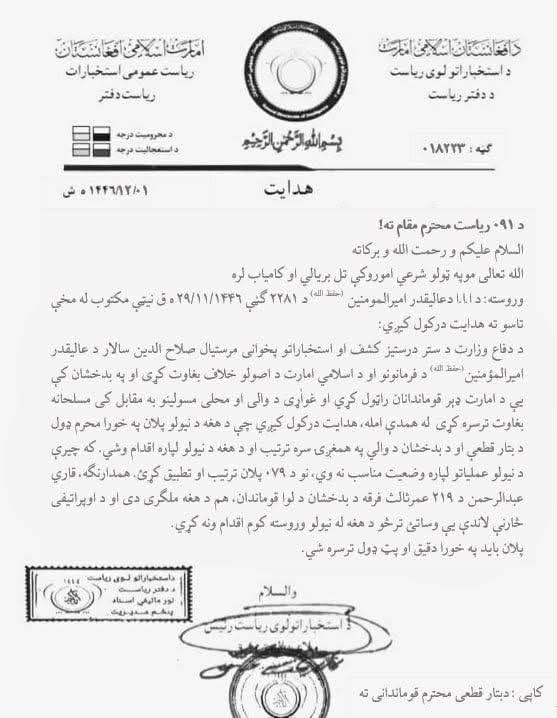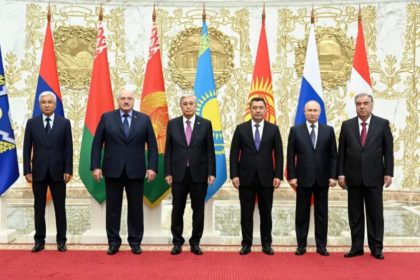RASC News Agency: A leaked directive reportedly issued by the Taliban’s General Directorate of Intelligence has surfaced online, revealing a dramatic escalation of intra-group tensions and ethnic rivalries within the militant regime. The document calls for the immediate arrest of Salahuddin Salar, a former deputy chief of military intelligence at the Taliban-controlled Ministry of Defense. Dated June 24, the classified order accuses Salar of “rebellion,” “defiance of the Emir’s command,” and “unauthorized coordination with local commanders in Badakhshan province” that allegedly undermines the Taliban’s internal hierarchy. The order, now widely circulated on social media, bears the letterhead of the Taliban intelligence service and names another individual Commander Abdul Rahman as a co-conspirator. Both men are to be arrested “without delay,” the document states.
The directive has been dispatched to Taliban’s regional intelligence outpost, known as Security Division 91, and to the provincial governor of Badakhshan. It authorizes the use of force should the accused refuse to surrender, calling for a joint operation by Taliban’s elite Special Unit 199 and Tactical Force 79. Execution of the operation is to be reported directly to the group’s leadership prior to implementation. This latest incident sheds stark light on the Taliban’s growing internal instability, particularly its failure to integrate non-Pashtun members into meaningful command roles. Salahuddin Salar, believed to be of Tajik descent, had previously voiced concern over what he described as systemic Pashtun favoritism within the Taliban’s provincial structure in Badakhshan. According to local sources, his attempts to challenge ethnically biased policies were met with increasing hostility from senior Taliban figures.
Though a temporary lull in tensions had been brokered last year by Qari Fasihuddin Fitrat the Taliban’s Chief of Army Staff and one of the few non-Pashtun figures in a senior military role this new order indicates that dissent within the ranks is no longer being tolerated, regardless of one’s position or service record. Analysts say the arrest order reflects more than a mere disciplinary issue; it signals a broader purge underway within the Taliban’s intelligence and military hierarchy, particularly targeting officers who deviate from the dominant tribal chain of command. As the group struggles to hold together an increasingly fractured network of regional and ethnic interests, its internal contradictions especially between southern Kandahari factions and northern commanders are becoming more difficult to conceal.
Residents of Badakhshan and civil society observers view the arrest order not just as a punitive measure but as part of a calculated campaign to suppress any form of independent authority outside the Taliban’s Pashtun core leadership. “This is less about rebellion and more about silencing those who do not conform to the Taliban’s ethnic monopoly on power,” said one local elder, speaking on condition of anonymity for fear of reprisal. As of this report, the Taliban has neither confirmed nor denied the authenticity of the leaked document. Salahuddin Salar has also remained silent, and no official statement has been released from his camp.
The silence, however, is telling. It reflects the Taliban’s broader strategy of governing through opacity, fear, and coercion where public discourse is stifled, ethnic dissent is criminalized, and internal disputes are resolved not through dialogue, but through intimidation and armed enforcement. This episode serves as yet another illustration of how the Taliban’s promises of national unity and inclusive governance are little more than hollow rhetoric. In practice, the group remains deeply fractured, tribally driven, and intolerant of both internal critique and ethnic plurality. The arrest order for Salahuddin Salar is not simply an internal disciplinary note it is a symptom of a regime unraveling beneath the surface.






